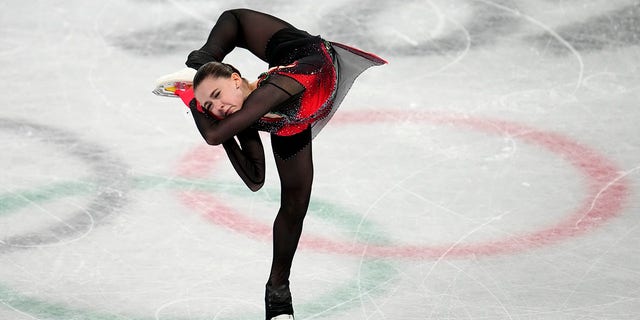Russian officials rule ‘no fault’ for figure skater Kamila Valieva in doping probe
A Russian tribunal found figure skater Kamila Valieva bore “no fault or negligence” in a doping case that rocked last year’s Winter Olympics, the World Anti-Doping Agency said Friday.
The Russian skater won Olympic gold in the team competition in February before it was announced that a sample she had given two months before had tested positive for a banned substance.
The result was reported later because the laboratory that tested the sample had been affected by the coronavirus pandemic.
WADA said it was “concerned” that a Russian Anti-Doping Agency panel ruled that Valieva should only be disqualified from one day of the 2021 Russian national championships, where the sample was taken.
“The tribunal found that although the athlete had committed an Anti-Doping Rule Violation, she bore ‘no fault or negligence’ for it. As such, the tribunal imposed no sanction except for the disqualification of her results on the date of the sample collection,” WADA said in the statement.
RUSSIA CAN RETURN TO OLYMPIC QUALIFIERS, INTERNATIONAL SPORTING EVENTS BY COMPETING AS PART OF ASIA
WADA said it would review the case file before deciding on further steps. WADA had previously complained Russia was taking too long to reach a decision in Valieva’s case and sought to have it moved to the Switzerland-based Court of Arbitration for Sport.

“Based on the elements of the case with which WADA is already familiar, the agency is concerned by the finding of ‘no fault or negligence’ and will not hesitate to exercise its right of appeal to the Court of Arbitration for Sport, as appropriate,” WADA said.
The Russian agency has not published the verdict. It has previously said it would not publish any findings related to the case because Valieva was only 15 at the time she tested positive.
Depending on the eventual result of any appeal, the case could result in the United States being upgraded from silver to gold in the team event.
CAS typically takes months to process cases. A previous CAS panel of judges allowed Valieva to compete in the women’s individual event at the Beijing Games even under suspicion of doping, in part because of her age. She placed fourth in the women’s competition and another Russian, Anna Shcherbakova, won the gold.
Read the full article Here


